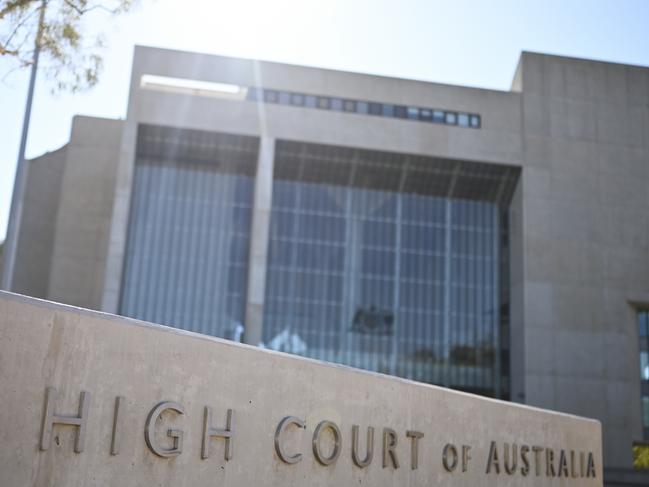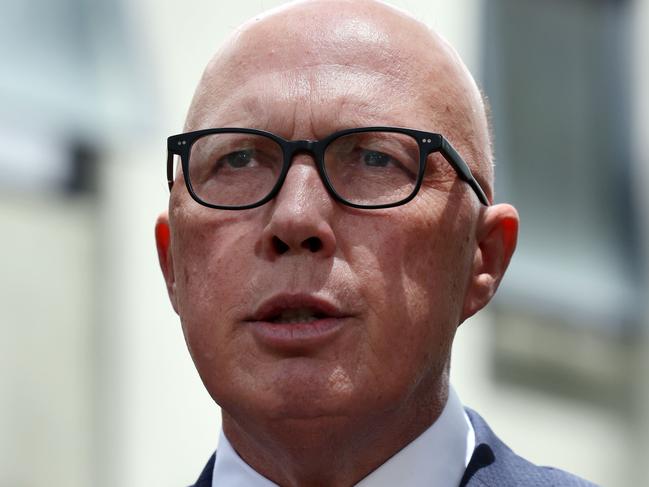Australia High Court immigration ruling: Everything you need to know
A political bunfight has erupted over the release of 148 refugees – including rapists and murderers – after a High Court ruling. See how the controversial decision unfolded.
National
Don't miss out on the headlines from National. Followed categories will be added to My News.
A landmark High Court ruling which has prompted the release of 148 refugees in detention – including rapists, murderers and drug traffickers – has sparked political backlash.
Eight days after the court ruling, Labor rushed through emergency laws to mandate ankle monitoring bracelets that will be overseen by the Australian Federal Police and curfews for the released detainees, and plans this week to pass a bill that would put the most serious offenders back behind bars.
Meanwhile, Opposition leader Peter Dutton has led calls for Immigration Minister Andrew Giles and Home Affairs Minister Clare O’Neil to stand down.
“The reason these criminals are in the community is because of the ministers’ incompetence,” Mr Dutton said.
“Their decisions have resulted in further Australians being (allegedly) harmed. It’s a disgrace. No further excuses.”
But Federal Labor MP Bill Shorten said there was “no logic” to blame ministers for a judicial decision.
“The logic of that is that the High Court should resign if you think that there was some way to prevent this,” he said.
“Once the reasons were made available for the High Court decision a week ago, the ministers moved with utmost speed to introduce preventive detention laws where if a court thinks that one of these detainees, former detainees, is a risk to safety, then they can be put back into preventive detention.”
Here is how the drama unfolded:

HIGH COURT – ‘NZYQ’ DECISION
On November 29, 2023 the High Court handed down a short judgement in the case of NZYQ.
The man, who cannot be named, is a stateless Rohingya Muslim who arrived by boat to Australia in 2012, was convicted of child sexual abuse of a 10-year-old in 2015 and released on parole in 2018.
On release he had his visa cancelled and not having a right to remain in the country was subsequently held in detention.
But he could not be returned to Myanmar due to the risk of persecution and no other country was willing to take him leading to him being held indefinitely in immigration detention.
LEGAL PRECEDENT
The man took the matter to the High Court in a bid to overturn a 20-year legal precedent for indefinite detention, arguing on the grounds it should be the courts that decide if a person should be held in detention, not governments.
The man, aged 28-30, argued he could potentially be held in detention for the rest of his life.
On November 7, the High Court unanimously agreed and ordered his immediate release and with him all other in similar circumstances.
The ruling brought to an end the system of indefinite immigration detention that has prevailed since 2004.

HIGH COURT’S REASONS
Last week the High Court released reasons for its judgement and essentially ruled the government had infringed upon the Constitution, using powers reserved only for courts to determine who should or shouldn’t be held in custody.
The determination only applies to those who have “no real prospect” of being deported from Australian shores such as in the case of NZYQ.
DOES IT APPLY TO ALL DETAINEES?
It does not apply to all detainees set to be deported where a pathway for deportation is clear under law.
That is those that are 1) stateless, 2) have been found to be owed “protection” or 3) cannot be removed due to a practical barrier such as a person physically or mentally unfit or whose home countries won’t help in their return.
WHO DID IT IMPACT?
The ruling meant 148 dangerous non-citizens had to be released into the community.
WHAT IS THE FEDERAL GOVERNMENT DOING ABOUT IT?
The Federal Government introduced draft laws that added strict conditions to those released such as reporting to police and ankle trackers and was passed.
The government last week then moved to have stronger detention legislation aimed at re-detaining some of those freed by the High Court. The political headache over the detention of non-citizens was one step closer to being resolved after the Senate pushed through new laws on Tuesday afternoon, earlier than expected.
Nationals senator Bridget McKenzie said Labor’s response to the High Court fallout was the biggest failure in the migration portfolio since 2012.
“The government knew back in June that the High Court was likely to make this decision and they failed to do the preparatory work to actually ensure that Australians are being kept safe. I mean, it’s the first role of government and now sexual predators and convicted criminals are loose on our streets and Australians are being harmed,” she said.

Mr Shorten demanded the senator answer “yes or no” on if the Coalition would support Labor’s preventive detention regime.
“On one hand, you say Labor’s not doing enough and then the other hand just sort of got yourself out there on the sun lounge ordering a form of a legislative pina colada,” he said.
Senator McKenzie said she would support legislation “that gets it right”.
“We’re not going to support a bad Bill, so it needs to be amended. We will be amending in the Senate,” she said.
WHERE ARE THE RELEASED DETAINEES NOW?
He will face Melbourne Magistrates’ Court on Wednesday afternoon.
It comes after a the former ringleader of a child exploitation gang who was released from immigration detention last month became the third criminal asylum seeker arrested since being freed.
The Herald Sun revealed that Emran Dad, 33, had been arrested in Dandenong amid allegations he has breached his reporting obligations and made contact with minors.
Dad is a registered sex offender previously alleged by police to have headed a prostitution ring which preyed on children in state care.
Earlier two men released by the High Court were rearrested last weekend for new unrelated alleged offences.
One was an Afghani refugee Aliyawar Yawari, who was released into the South Australian community after he was initially locked up for multiple attacks and indecent assaults on women and was labelled by the courts as a “danger to the Australian community”.
Yawari was rearrested on the weekend for an alleged indecent assault and on Tuesday was charged with indecently assaulting another woman.
The other former detainee was arrested in NSW and now charged with alleged possession of a prohibited drug (cannabis).
Peter Dutton said the arrests of the two former High Court detainees were “predictable and avoidable”.
The Opposition Leader amplified fears over public safety and said the government should have had preventive laws in place back in June.
“Unfortunately, now that they’ve released 147 people in total, with a potential 340 more, the likelihood of attacks, and given the cohort, the nature of these people, the high degree of the viciousness of some of the offending, the very high likelihood is that there will be more victims,” Mr Dutton said.
Last month, Labor and the Coalition teamed up to pass laws requiring former detainees to wear ankle bracelets and abide by strict curfews, regardless of whether they had criminal convictions.
South Australian Assistant Commissioner of Crime John Venditto said police officers were monitoring the two registered sex offenders from a total of six former detainees now free in the state following November’s High Court decision striking down indefinite detention.
“We know where they are, we visit them,” the assistant commissioner said.
“We give them the conditions. We make sure they don’t go near children, we make sure children don’t go near them.”
– With Courtney Gould, Madeleine Achenza and Duncan Evans, of NCA Newswire
Originally published as Australia High Court immigration ruling: Everything you need to know


